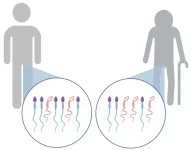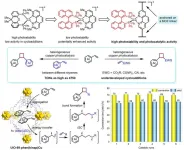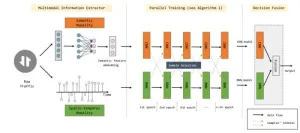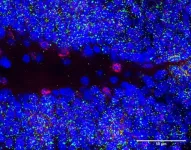(Press-News.org) The impact of abdominal fat on brain health and cognition is generally more pronounced in middle-aged men at high risk of Alzheimer’s disease as opposed to women, according to researchers at Rutgers Health.
In middle-aged individuals with a family history of Alzheimer’s disease, the amount of fat in their abdominal organs (pancreas, liver, and belly fat) is related to their brain volumes and cognitive function, according to the study published in the journal Obesity. The study was written by Sapir Golan Shekhtman, a Ph.D. student at the Joseph Sagol Neuroscience Center at the Sheba Medical Center in Israel and led by Michal Schnaider Beeri, director of the Herbert and Jacqueline Krieger Klein Alzheimer’s Research Center at Rutgers Brain Health Institute.
The research, conducted on 204 healthy middle-aged Alzheimer’s-dementia offspring, investigated fat depots in the pancreas, liver and abdomen measured with MRI.
“In middle-aged males at high Alzheimer's disease risk—but not females—higher pancreatic fat was associated with lower cognition and brain volumes, suggesting a potential sex-specific link between distinct abdominal fat with brain health,” said Beeri, who is the Krieger Klein Endowed Chair in Neurodegeneration Research at BHI and a faculty member of the Rutgers Institute for Health, Health Care Policy and Aging Research.
Obesity is a risk factor for lower cognitive functioning and higher dementia risk, with different associations between sexes.
The research findings highlight the importance of investigating the interrelationships of fat depots, brain aging and cognition in the context of sex differences.
Additionally, the study challenges the conventional use of body mass index (BMI) as the primary measure for assessing obesity-related cognitive risks. The researchers said BMI poorly represents body fat distribution and does not necessarily account for sex differences.
“Our findings indicate stronger correlations compared to the relationships between BMI and cognition, suggesting that abdominal fat depots, rather than BMI, is a risk factor for lower cognitive functioning and higher dementia risk,” said Shekhtman.
These research findings open new avenues for targeted interventions and further exploration of sex-specific approaches in understanding and mitigating the impact of abdominal fat on brain health, Shekhtman noted.
END
Abdominal fat can impact brain health and cognition in high Alzheimer’s risk individuals
For some middle-aged people, the amount of fat in the pancreas, liver and belly is related to brain volumes and function, Rutgers Health study finds
2024-02-27
ELSE PRESS RELEASES FROM THIS DATE:
New data analysis supports hedonic overdrive model in high-fat diet-induced mice
2024-02-27
ROCKVILLE, Md.— High-fat diets cause obesity in male mice. The underlying mechanism, however, remains controversial. After assessing three contrasting ideas, researchers have determined that the hedonic overdrive model provides the best fit, according to a new study published in the journal Obesity, The Obesity Society’s (TOS) flagship journal.
“Our work provides some direction as to why high-fat/high-carb macronutrient combinations stimulate overconsumption. The study is in mice so we ...
Pythagoras was wrong: there are no universal musical harmonies, new study finds
2024-02-27
The tone and tuning of musical instruments has the power to manipulate our appreciation of harmony, new research shows. The findings challenge centuries of Western music theory and encourage greater experimentation with instruments from different cultures.
According to the Ancient Greek philosopher Pythagoras, ‘consonance’ – a pleasant-sounding combination of notes – is produced by special relationships between simple numbers such as 3 and 4. More recently, scholars have tried to find psychological explanations, but these ‘integer ratios’ are still credited with making a chord sound beautiful, and deviation from them ...
Researchers uncover new clues about links between parent age and congenital disorders
2024-02-27
A new paper in Genome Biology and Evolution, published by Oxford University Press, finds that the link between paternal age and rare congenital disorders is more complex than scientists had previously thought. While researchers have long realized that older fathers are more likely to have children with bone and heart malformations, such as Achondroplasia, Apert, or Noonan syndrome or neurodevelopmental disorders, schizophrenia, and autism, new examination indicates that while the link between some pathogenic mutations increases with paternal age, others do not and may even occur in the father’s testis before sexual maturity.
Delayed fatherhood results in a higher ...
Study reveals parental smoking and childhood obesity link transcends socio-economic boundaries
2024-02-27
A study into parental smoking and childhood obesity has challenged previous notions by revealing that the links between the two are not confined to a specific socio-economic group.
The data shows a strong correlation between parents who smoke and their children’s consumption of high calorie unhealthy foods and drinks, across social classes.
Using longitudinal data on 5,000 Australian children collected over a 10-year period, the research found those living with parents who smoke, on average, eat less healthy, higher calorie food such as fruit juice, sausages, fries, snacks, full fat milk products, ...
HKU chemists pave the way for sustainable organic synthesis with innovative heterogeneous copper photocatalysis, enabling efficient production of diverse bioactive compounds
2024-02-27
Professor Jian HE, from the Department of Chemistry at The University of Hong Kong (HKU), has spearheaded a research endeavour aimed at revolutionising organic synthesis. His research team has successfully developed a novel heterogeneous copper photocatalyst that enables the efficient formation of cyclobutane rings, a crucial structural element in a vast array of bioactive molecules. Cyclobutane rings are prominently featured in pharmaceuticals, natural products, and various biologically active compounds. By enabling researchers to construct these rings easily and selectively, ...
Using multimodal deep learning to detect malicious traffic with noisy labels
2024-02-27
The success of a deep learning-based network intrusion detection systems (NIDS) relies on large-scale, labeled, realistic traffic. However, automated labeling of realistic traffic, such as by sand-box and rule-based approaches, is prone to errors, which in turn affects deep learning-based NIDS.
To solve the problems, a research team led by Yuefei ZHU published their new research on 15 Feb 2024 in Frontiers of Computer Science co-published by Higher Education Press and Springer Nature.
The team ...
Learning and memory problems in down syndrome linked to alterations in genome's ‘dark matter’
2024-02-27
Researchers at the Centre for Genomic Regulation (CRG) reveal that the Snhg11 gene is critical for the function and formation of neurons in the hippocampus. Experiments with mice and human tissues revealed the gene is less active in brains with Down syndrome, potentially contributing to the memory deficits observed in people living with the condition. The findings are published today in the journal Molecular Psychiatry.
Traditionally, much of the focus in genomics has been on protein-coding genes, which in humans constitutes around just 2% of the entire genome. The rest is "dark ...
Race, racism, and covid-19 in the US: lessons not learn
2024-02-27
In The BMJ today, Keisha Bentley-Edwards at Duke University, North Carolina, and colleagues argue that systemic racism and economic inequality are at the root of disparity in covid-19 outcomes and suggest how to distribute resources more equitably.
The article is part of a series that highlights the lessons that can be learned from the US’s covid-19 experience and the actions that are needed to prevent the loss of another million citizens in the next pandemic and improve and protect population health.
"Rather than waiting for the next pandemic to address systemic failures, the ...
Low-Temperature Plasma used to remove E. coli from hydroponically grown crops
2024-02-27
A group led by researchers at Nagoya University and Meijo University in Japan has developed a disinfection technology that uses low-temperature plasma generated by electricity to cultivate environmentally friendly hydroponically grown crops. This innovative technology sterilizes the crops, promoting plant growth without the use of chemical fertilizers. Their findings appeared in Environmental Technology & Innovations.
In hydroponic agriculture, farmers cultivate plants by providing their roots with a nutrient solution. However, the nutrient solution can become infected with pathogenic E. coli strains, contaminating the crop and leading to foodborne illnesses.
To avoid ...
UK cancer treatment falls behind other countries
2024-02-27
Two major studies part-funded by Cancer Research UK reveal that the use of chemotherapy and radiotherapy in the UK has lagged behind comparable countries in the past decade
Patients faced longer waits to begin key cancer treatment, which could be impacting people’s chances of survival in the UK
With an upcoming UK general election, Cancer Research UK is calling on political leaders to step up and ensure patients get the level of care that they deserve
People in the UK were treated with chemotherapy ...
LAST 30 PRESS RELEASES:
Low-intensity treadmill exercise preconditioning mitigates post-stroke injury in mouse models
How moss helped solve a grave-robbing mystery
How much sleep do teens get? Six-seven hours.
Patients regain weight rapidly after stopping weight loss drugs – but still keep off a quarter of weight lost
GLP-1 diabetes drugs linked to reduced risk of addiction and substance-related death
Councils face industry legal threats for campaigns warning against wood burning stoves
GLP-1 medications get at the heart of addiction: study
Global trauma study highlights shared learning as interest in whole blood resurges
Almost a third of Gen Z men agree a wife should obey her husband
Trapping light on thermal photodetectors shatters speed records
New review highlights the future of tubular solid oxide fuel cells for clean energy systems
Pig farm ammonia pollution may indirectly accelerate climate warming, new study finds
Modified biochar helps compost retain nitrogen and build richer soil organic matter
First gene regulation clinical trials for epilepsy show promising results
Life-changing drug identified for children with rare epilepsy
Husker researchers collaborate to explore fear of spiders
Mayo Clinic researchers discover hidden brain map that may improve epilepsy care
NYCST announces Round 2 Awards for space technology projects
How the Dobbs decision and abortion restrictions changed where medical students apply to residency programs
Microwave frying can help lower oil content for healthier French fries
In MS, wearable sensors may help identify people at risk of worsening disability
Study: Football associated with nearly one in five brain injuries in youth sports
Machine-learning immune-system analysis study may hold clues to personalized medicine
A promising potential therapeutic strategy for Rett syndrome
How time changes impact public sentiment in the U.S.
Analysis of charred food in pot reveals that prehistoric Europeans had surprisingly complex cuisines
As a whole, LGB+ workers in the NHS do not experience pay gaps compared to their heterosexual colleagues
How cocaine rewires the brain to drive relapse
Mosquito monitoring through sound - implications for AI species recognition
UCLA researchers engineer CAR-T cells to target hard-to-treat solid tumors
[Press-News.org] Abdominal fat can impact brain health and cognition in high Alzheimer’s risk individualsFor some middle-aged people, the amount of fat in the pancreas, liver and belly is related to brain volumes and function, Rutgers Health study finds





